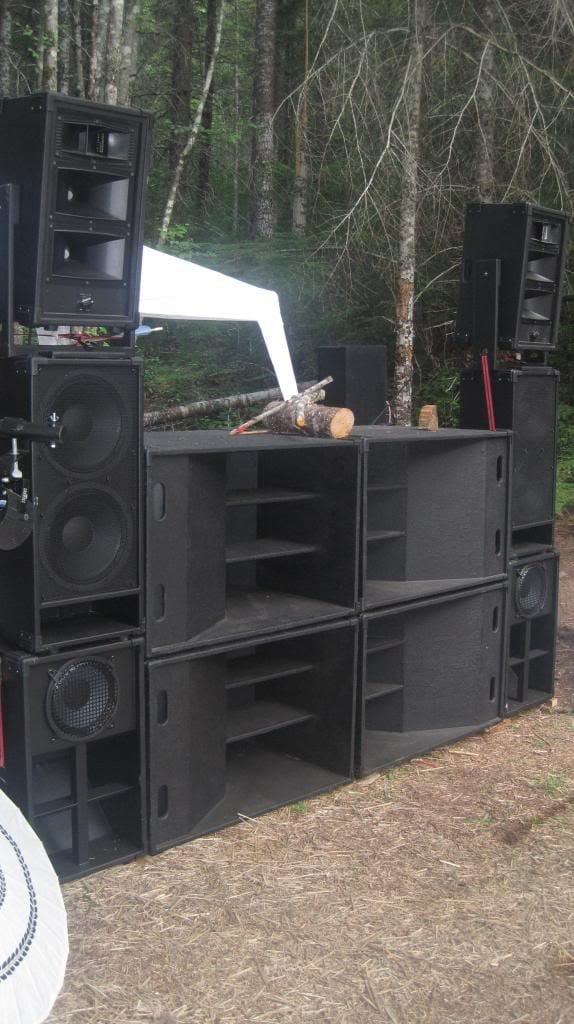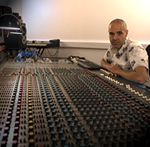- Posts: 12
- Thank you received: 0
The importance of enclosure shape
- keith
-
 Topic Author
Topic Author
- Offline
- New Member
-

Less
More
11 years 10 months ago - 11 years 10 months ago #21523
by keith
The importance of enclosure shape was created by keith
Has anyone experimented with different dimensional ratios while maintaining consistent volume?
Certainly this is one of the most critical factors that determine how good a room sounds. I have also built a few percussion "stomp boxes". Think small, stout, ported speaker box (but no drivers) with a thin plywood top for stomping out a back beat on. Using the same dimensional ratios as those of an acoustically "ideal" room yields the richest sounding stomp box. Other ratios produce honky, clicky, or of course boxy sounding stomp boxes.
Is there an acoustical benefit to trying to mimic the 1.6X ratio?
i.e. D x W x H, where W = (1.6 x D) and H = (1.6 x W).
In a room, the problem ends up being the interaction between modes. Doesn't this appear in speaker enclosures as well?
BTW, thanks for the great site.
Take care all, Keith
P.S. Interestingly, this ends up being the same ratio recognized, first by the ancient Romans, as visually balanced and aesthetically pleasing. Maybe it's God's formula for beauty. Or, maybe not.
Certainly this is one of the most critical factors that determine how good a room sounds. I have also built a few percussion "stomp boxes". Think small, stout, ported speaker box (but no drivers) with a thin plywood top for stomping out a back beat on. Using the same dimensional ratios as those of an acoustically "ideal" room yields the richest sounding stomp box. Other ratios produce honky, clicky, or of course boxy sounding stomp boxes.
Is there an acoustical benefit to trying to mimic the 1.6X ratio?
i.e. D x W x H, where W = (1.6 x D) and H = (1.6 x W).
In a room, the problem ends up being the interaction between modes. Doesn't this appear in speaker enclosures as well?
BTW, thanks for the great site.
Take care all, Keith
P.S. Interestingly, this ends up being the same ratio recognized, first by the ancient Romans, as visually balanced and aesthetically pleasing. Maybe it's God's formula for beauty. Or, maybe not.
Last edit: 11 years 10 months ago by keith. Reason: Wanted to add something.
Please Log in or Create an account to join the conversation.
- bgrade
-

- Offline
- Elite Member
-

Less
More
- Posts: 175
- Thank you received: 25
11 years 10 months ago - 11 years 10 months ago #21524
by bgrade
Replied by bgrade on topic The importance of enclosure shape
I have always been told that 1 : 1.618 : 0.618 (which is pretty close to what you suggested) is a golden ratio for canceling resonant frequencies. I have used it, but the boxes are not greatly convenient for PA stacking. It did sound good though.
Last edit: 11 years 10 months ago by bgrade.
Please Log in or Create an account to join the conversation.
- keith
-
 Topic Author
Topic Author
- Offline
- New Member
-

Less
More
- Posts: 12
- Thank you received: 0
11 years 10 months ago #21535
by keith
Replied by keith on topic The importance of enclosure shape
I remember it as 0.618 : 1 : 1.618 too but who has time for all those extra characters?
If your room dimensions aren't ideal, it's always possible to check the calculations and find dimensions that are a good compromise. So why as I search these discussions, I see many mentions of compromise but never a consideration of this ratio that seems to be kind of important to sound quality and character?
I guess I have a direction to investigate, eh?
If your room dimensions aren't ideal, it's always possible to check the calculations and find dimensions that are a good compromise. So why as I search these discussions, I see many mentions of compromise but never a consideration of this ratio that seems to be kind of important to sound quality and character?
I guess I have a direction to investigate, eh?
Please Log in or Create an account to join the conversation.
- Rog Mogale
-

- Offline
- Premium Member
-

Less
More
- Posts: 120
- Thank you received: 19
11 years 10 months ago #21563
by Rog Mogale
Replied by Rog Mogale on topic The importance of enclosure shape
Hi Keith,
There are many papers and sections of publications dedicated to how enclosure shape effects and interacts with sound. Try Vance Dickinson and Martin Collums books for this kind of thing. They made measurements for different enclosure shapes and you can clearly see the differences.
From my own experimentation I can tell you that for bass, as the frequencies involved are long compared to the enclosure size, its more important that you have a well braced enclosure with any ports being of suitable size and placed correctly. The enclosure shape will be of secondary importance if you are not intending to lo pass above 150Hz. Above that and you increase the risk of hearing the internal of the enclosure though any ports.
For midrange then yes, enclosure shape will have an effect. It’s normally a standing wave on one or more adjacent panels that will give rise to problems. These problems can be seen as a spike in frequency response and a phase abnormality. Normally for say a 12” driver in a reflex box your any problems will be in the 500 to 900Hz range. If it’s a sealed box then you will only hear the standing wave induced spike though the cone, if it’s a reflex box then you will hear more of the problem though the port. Many believe that high levels of internal damping material with help eliminate standing waves, but the truth is damping can only reduce the enclosures Q though isothermalising effects changing the operating characteristics of the enclosure. The standing wave will still be there, but you may hear less of its effect though the reduced transmission of internal noise. High levels of damping bring their own set of problems like a decrease in efficiency, so the real answer is a well designed and inert enclosure in the first place.
Sometimes you can design a speaker that on paper and in simulations programs looks great. You build it and it just sounds wrong. Change a few dimensions and wall angles and the sound can really open up have lower coloration and sound great. So enclosure shape really does make a big difference to the contribution of the overall sound in frequencies above 150Hz.
Rog.
There are many papers and sections of publications dedicated to how enclosure shape effects and interacts with sound. Try Vance Dickinson and Martin Collums books for this kind of thing. They made measurements for different enclosure shapes and you can clearly see the differences.
From my own experimentation I can tell you that for bass, as the frequencies involved are long compared to the enclosure size, its more important that you have a well braced enclosure with any ports being of suitable size and placed correctly. The enclosure shape will be of secondary importance if you are not intending to lo pass above 150Hz. Above that and you increase the risk of hearing the internal of the enclosure though any ports.
For midrange then yes, enclosure shape will have an effect. It’s normally a standing wave on one or more adjacent panels that will give rise to problems. These problems can be seen as a spike in frequency response and a phase abnormality. Normally for say a 12” driver in a reflex box your any problems will be in the 500 to 900Hz range. If it’s a sealed box then you will only hear the standing wave induced spike though the cone, if it’s a reflex box then you will hear more of the problem though the port. Many believe that high levels of internal damping material with help eliminate standing waves, but the truth is damping can only reduce the enclosures Q though isothermalising effects changing the operating characteristics of the enclosure. The standing wave will still be there, but you may hear less of its effect though the reduced transmission of internal noise. High levels of damping bring their own set of problems like a decrease in efficiency, so the real answer is a well designed and inert enclosure in the first place.
Sometimes you can design a speaker that on paper and in simulations programs looks great. You build it and it just sounds wrong. Change a few dimensions and wall angles and the sound can really open up have lower coloration and sound great. So enclosure shape really does make a big difference to the contribution of the overall sound in frequencies above 150Hz.
Rog.
Please Log in or Create an account to join the conversation.
- keith
-
 Topic Author
Topic Author
- Offline
- New Member
-

Less
More
- Posts: 12
- Thank you received: 0
11 years 10 months ago #21566
by keith
Replied by keith on topic The importance of enclosure shape
Hi Rog,
Thanks so much for addressing my question and big thanks for the Dickinson and Collums recos.
I've spent years in the recording studio and am amazed at how little it has prepared me for sound reinforcement. Hell, I'm still wrestling with the stereo v. mono issue. The only thing I think I've learned for sure so far is that I seem to prefer tighter hi/mids with 10 inch LF drivers over larger LF drivers.
Thanks for the help.
Keith
Thanks so much for addressing my question and big thanks for the Dickinson and Collums recos.
I've spent years in the recording studio and am amazed at how little it has prepared me for sound reinforcement. Hell, I'm still wrestling with the stereo v. mono issue. The only thing I think I've learned for sure so far is that I seem to prefer tighter hi/mids with 10 inch LF drivers over larger LF drivers.
Thanks for the help.
Keith
Please Log in or Create an account to join the conversation.
Time to create page: 0.171 seconds